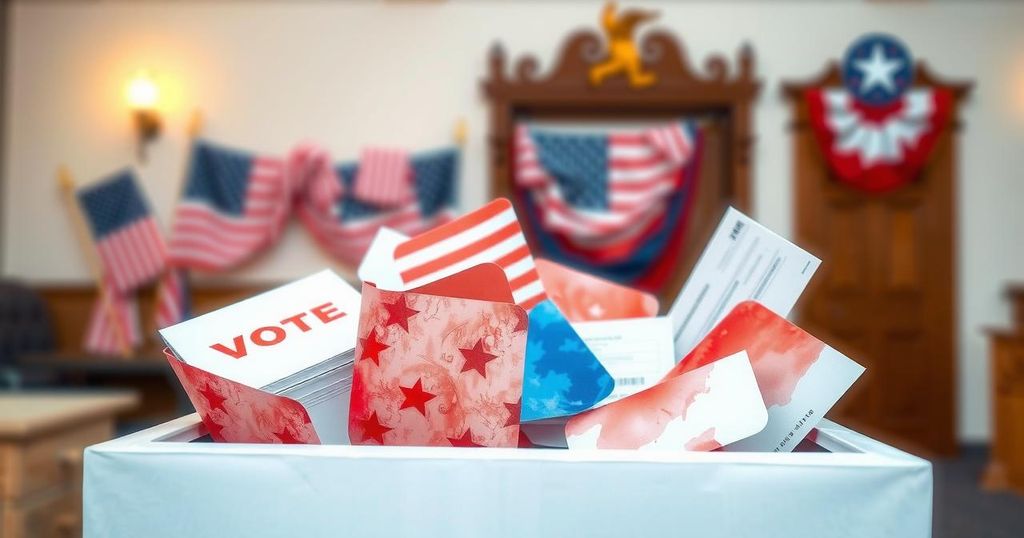World news
2024 PRESIDENTIAL ELECTION, AFRICA, AP, BRENNAN CENTER FOR JUSTICE, COURT, ELECTION, GHANA, ILLINOIS, MADISON, MAGGIE FREESPIRIT, MINNESOTA, MUSK, NORTH AMERICA, POLITICS, PRESIDENTIAL ELECTION 2024, RAVELY, REPRODUCTIVE RIGHTS, SOROS, SUPREME COURT, THE ASSOCIATED PRESS, UNITED STATES, WA, WISCONSIN
Marisol Gonzalez
0 Comments
Wisconsin Supreme Court Election: A Crucial Referendum on National Politics
Wisconsin is holding a crucial Supreme Court election influenced by significant campaign contributions from prominent figures like Elon Musk. The election, involving candidates Brad Schimel and Susan Crawford, reflects national political tensions regarding issues such as abortion and voting rights. With record-breaking spending of $59 million, this contest has become a focal point for broader political strategies leading into upcoming elections.
Wisconsin voters have commenced their participation in a significant state Supreme Court election marked by substantial financial contributions from influential donors, including billionaire Elon Musk. This election serves as a representation of broader national political conflicts as it directly influences the ideological composition of the court, which could ultimately affect crucial issues such as abortion rights, voting regulations, and immigration policies.
The high-stakes race pits Republican-backed candidate Brad Schimel against Democratic-supported candidate Susan Crawford, capturing national media attention. Notably, the spending has surpassed previous records, raising approximately $59 million, primarily from mega-donors on both sides, with a specific $11 million attributed to groups associated with Musk, illustrating the far-reaching implications of this local contest.
As early voting progresses, residents of Wisconsin have expressed their apprehensions regarding the impact of external political interests. Voters highlight the court’s potential decisions affecting vital rights, with some indicating that external financial influence undermines the integrity of what should be a state-level judicial election.
Comments from residents reflect the polarized political atmosphere. For instance, Maggie Freespirit, a retired electrician, expressed her confidence in Crawford supporting abortion rights, while 72-year-old Steve Ravely conveyed his support for Schimel based on his stances on immigration and the economy, emphasizing concerns over liberal megadonors such as George Soros.
The extensive funding in the election has raised alarm among some voters, particularly in urban areas like Milwaukee, where several individuals fear that the financial dominance of Musk could skew the results. Both Schimel and Crawford are utilizing the looming influence of Musk and Trump as a pivotal part of their campaigning strategies, revealing the broader implications for the upcoming presidential elections.
Beyond the immediate race, prominent figures are mobilizing efforts for increased voter turnout. Democratic supporters, including influential individuals like Minnesota Governor Tim Walz and former Attorney General Eric Holder, are actively working to engage voters in communities strategically neglected by right-wing influence. This election is not just a local matter but a crucial battleground for American political dynamics, exemplifying the increasing intertwining of state judicial contests and national political allegiance.
In conclusion, the Wisconsin Supreme Court election represents a significant convergence of local judicial processes with national political influences, primarily characterized by substantial financial backing from billionaires like Elon Musk. As voters weigh their options between candidates Schimel and Crawford, the ideological outcomes could reverberate through critical social issues and the political landscape heading into future elections. The ongoing efforts from both sides reveal the election’s pivotal role in shaping not only state policies but the broader trajectory of American democracy.
Original Source: www.newsweek.com




Post Comment